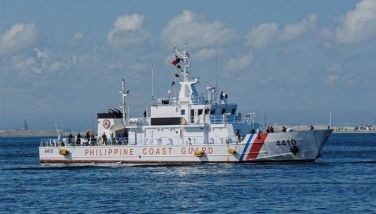Philippines: No basis in international law for Chinese claims
MANILA, Philippines - China’s expansive claims in disputed waters have no basis in the United Nations Convention on the Law of the Sea (UNCLOS) and encroach on the rights of coastal states, the Philippines told a UN tribunal Tuesday.
The hearing on the merits of Manila’s case against Beijing with the Permanent Court of Arbitration in The Hague began on Nov. 24 with the Philippine legal team presenting its arguments on why China’s “historic” claims and “nine-dash line” should be considered unlawful and without basis.
Solicitor General Florin Hilbay led in presenting the country’s “sequence of arguments.” A bulletin issued by Manila’s legal team cited principal counsel Paul Reichler’s telling the tribunal that there is no provision in UNCLOS validating China’s so-called historic claims in the West Philippine Sea and South China Sea. Beijing has insisted its position is based on UNCLOS.
“Reichler mentioned that China has asserted exclusive rights over the areas covered by the Nine-Dash Line and has deprived the Philippines of fishing and exploration activities,” the bulletin read.
Professor Bernard Oxman of the University of Miami School of Law discussed the unlawfulness of China’s claim, which is beyond its maritime entitlements under UNCLOS.
“Andrew Loewenstein argued that even assuming, for the sake of argument, that a claim of historic rights can exist after the UNCLOS, China has failed to satisfy the requirements to establish the claim, namely: a continuous exercise of exclusive control for a long period of time over the said area,” the bulletin said, referring to one of the lawyers representing the Philippines.
Loewenstein is a partner in Foley Hoag, the Boston-based law firm handling the case of the Philippines.
In a statement from The Hague, deputy presidential spokesperson Abigail Valte said Loewenstein presented eight maps, “the first of which dates back to the Ming Dynasty, to show that China’s territory did not include that which it claims now under the nine-dash line.”
Valte said the thrust of Manila’s presentation focused on the lack of basis for China to claim almost the entire South China Sea and West Philippine Sea.
The Philippines decided to resort to arbitration in 2013 after China began deploying more vessels in the West Philippine Sea and started building artificial islands where ports, airfields and other structures were being put up for military use.
The Chinese have also barred Filipinos from areas that had been the latter’s traditional fishing grounds for a long time.
The United States and other countries have joined the Philippines’ call to ensure freedom of navigation and overflight in the South China Sea and West Philippine Sea amid China’s provocative activities in the region.
China has said it would not stop its construction activities in disputed waters as it denied militarizing the South China Sea.
It has also refused to participate in the arbitration process, saying its claims were indisputable.
Confident
Speaker Feliciano Belmonte Jr., for his part, said he is confident of a favorable court ruling on the Philippines’ case in The Hague.
He noted that the tribunal’s earlier ruling on the issue of jurisdiction over the case has shown that Manila’s position stands on solid ground.
“As you can see at the very first issue, all our ideas were turned over to the parties there (Tribunal). This next one (oral hearings), which is really the crux of the situation; I believe the tribunal is prepared to rule on the applicability of the UNCLOS in our favor,” Belmonte told reporters.
“We are all great admirers of China as China has affected the economies of many nations but at the same time, we don’t want that some people can run roughshod over us because they are big and mighty,” he said.
“Fortunately, there are agencies such as the UN who see to it that the rule of law is followed and that is what we are banking on,” he added.
He said various sectors have been suggesting that the Philippines negotiate with China, something which the government has been doing for years.
“But in the case of China, their stand always is they can talk about anything but we cannot talk about sovereignty, meaning to say, sovereignty is a non-negotiable matter—‘this (West Philippine Sea) is ours’ they say — how can you agree to that?” Belmonte said.
He also said the Philippines should not rely too much on the US for support against China, as the former also has its interests to protect.
Meanwhile, in Zamboanga City, Foreign Affairs department spokesman Charles Jose said China’s persistent rejection of the arbitral proceedings would eventually hurt China’s international reputation.
Jose said China must realize that it is in its interest to sit down with the tribunal, specially if the international court would invalidate its so-called nine-dash line claims.
“Then we will see the reaction of China once (its claims) would be declared as illegal,” Jose added.
He said the Philippines would continue with its rules-based approach to dealing with its maritime row with China. Jose said the tribunal has not rejected any of the issues presented by the Philippines. – With Paolo Romero, Roel Pareño
- Latest
- Trending

























